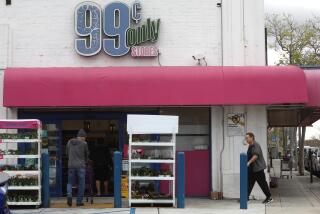Workers Take Cut
About 400 Southern California employees of System 99, an Oakland-based trucking company, have elected to voluntarily cut their wages in exchange for partial ownership of their company--a move that eventually may save their jobs.
The trucking industry, which has been swept by increased competition and lower freight rates since federal deregulation in 1980, has been undergoing a nationwide consolidation.
âWe have been struggling and we have had losses,â said System 99 President Allan N. Robison. âWe recognized that if we didnât do something innovative we would someday find ourselves unable to meet our competition, especially our non-union competition.â
The innovation that may save the firm is an Employee Stock Ownership Plan, which will eventually give the firmâs 1,400 employees a 40% stake in the company. System 99 is privately held, principally by six of the firmâs executives.
The stock ownership plan is voluntary and grants stock in the company to participating employees in exchange for a 15% pay cut. So far, 90% of the firmâs employees have elected to join the plan, Robison said.
An earlier stock plan had granted 20% of the firmâs ownership to employees for wage and salary concessions during 1982, 1983 and 1984. The new plan will provide an additional 20% over the next five years.
System 99 is one of thelargest union trucking lines with an ESOP program in the country. The firm projects revenues of $76.7 million in 1985, up from $72.3 million in 1984. It does business in more than 4,000 U.S. cities.
The plan also provides employees with a strong voice in management through a committee of four contract-labor representatives and three salaried employees. The committee, which acts as a communications arm for employee concerns, will nominate four members to the board.
Robison said the firmâs experience so far shows that employee ownership creates a greater sense of employee commitment and concern to the workplace. âAs a result of lowered labor costs and greater employee efficiency, System 99 will be in a stronger competitive composition with better opportunities to increase its market share,â Robison said.
More to Read
Sign up for Essential California
The most important California stories and recommendations in your inbox every morning.
You may occasionally receive promotional content from the Los Angeles Times.











